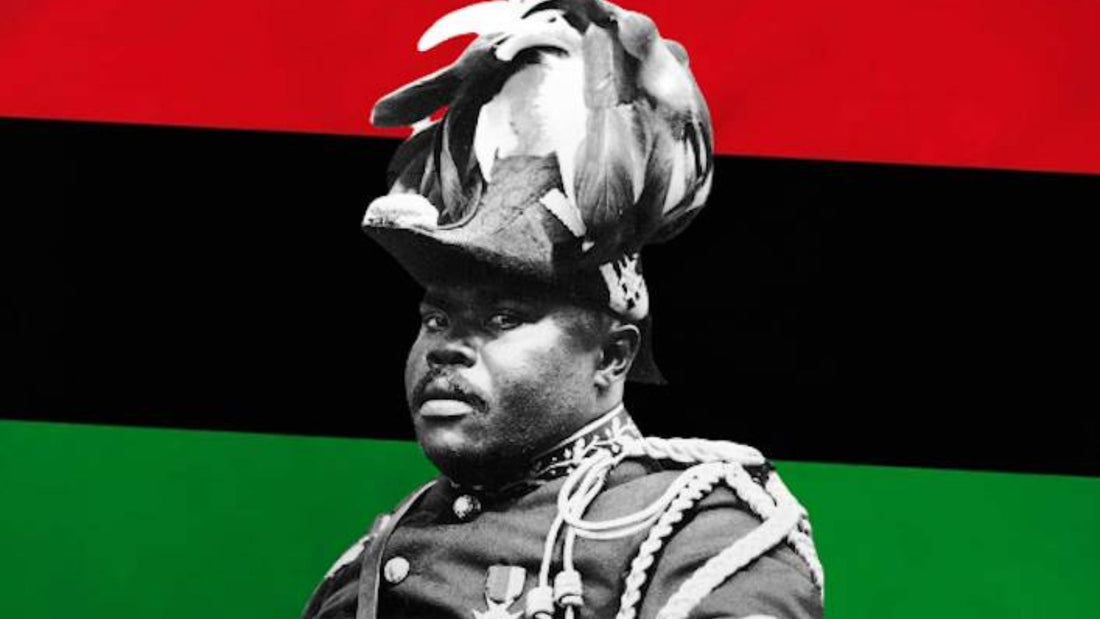⏳ 4 min read | by Pretty Boss
Marcus Garvey: The Blueprint for Black Empowerment
And the Legacy That Inspired Malcolm X
Black History Month is not just a time to reflect on the past. It’s a call to action for the present and the future. It’s a time to honor the leaders who dared to challenge oppression, uplift their people, and lay the foundation for self-determination. One such leader, whose impact echoes through generations, is Marcus Garvey.
 While Malcolm X’s transformation from Malcolm Little to one of the most powerful voices in history is inspiring, his journey was, in many ways, an extension of the work laid down by Garvey. In fact, Malcolm’s father, Earl Little, was a dedicated follower of Garvey and instilled in his son the principles of Black pride, economic independence, and self-reliance. Without Garvey, there would be no Malcolm X.
While Malcolm X’s transformation from Malcolm Little to one of the most powerful voices in history is inspiring, his journey was, in many ways, an extension of the work laid down by Garvey. In fact, Malcolm’s father, Earl Little, was a dedicated follower of Garvey and instilled in his son the principles of Black pride, economic independence, and self-reliance. Without Garvey, there would be no Malcolm X.
The Vision of Marcus Garvey: Building a Nation Within a Nation
Marcus Garvey was a man ahead of his time. Born in Jamaica in 1887, he saw firsthand the devastating effects of colonialism, racism, and economic disenfranchisement. Determined to empower Black people, he founded the Universal Negro Improvement Association (UNIA) in 1914, which would go on to become the largest Black organization of its time.
 Garvey’s vision was clear: Black people needed to control their own destiny. His message was not about assimilation but about independence. He championed economic self-sufficiency, political sovereignty, and cultural pride. Through the UNIA, he launched businesses, schools, newspapers, and even the Black Star Line, a fleet of ships designed to facilitate trade and transportation between Africa and the African diaspora.
Garvey’s vision was clear: Black people needed to control their own destiny. His message was not about assimilation but about independence. He championed economic self-sufficiency, political sovereignty, and cultural pride. Through the UNIA, he launched businesses, schools, newspapers, and even the Black Star Line, a fleet of ships designed to facilitate trade and transportation between Africa and the African diaspora.
Garvey’s philosophy was simple yet revolutionary:
“Up, you mighty race, accomplish what you will.”
He understood that true power comes not from seeking validation from oppressive systems, but from creating and owning resources that serve your people.
 The Connection Between Garvey and Malcolm X
The Connection Between Garvey and Malcolm X
Garvey’s influence did not die with his imprisonment and eventual exile. His ideas found their way into the minds of the next generation of leaders, including Malcolm X. Malcolm’s father, Earl Little, was a staunch Garveyite, preaching Black self-reliance and economic independence. Because of his father’s activism, Malcolm’s family was targeted by white supremacist groups, and his father was ultimately killed in what many believe was a racially motivated attack.
 This was Malcolm X’s introduction to the harsh reality of what it means to stand for something. His father was killed for believing in Black empowerment, and his mother was institutionalized after trying to hold the family together. The system that Garvey warned about was already at work, dismantling Black families and silencing those who dared to break free.
This was Malcolm X’s introduction to the harsh reality of what it means to stand for something. His father was killed for believing in Black empowerment, and his mother was institutionalized after trying to hold the family together. The system that Garvey warned about was already at work, dismantling Black families and silencing those who dared to break free.
The Price of Leadership: Garvey and Malcolm’s Shared Struggle
Both Garvey and Malcolm X understood a fundamental truth about leadership: standing for something will always come at a cost. Garvey was targeted by the FBI’s predecessor, the Bureau of Investigation, and was ultimately imprisoned on questionable charges. Malcolm X, decades later, faced the same fate. Constant surveillance, vilification, and ultimately assassination.
But here’s the thing: history does not remember the fearful. It remembers those who dared to defy the odds. Both men refused to be silent in the face of oppression. They refused to beg for a seat at the table and instead sought to build their own.
 The Lessons We Must Take from Garvey and Malcolm X
The Lessons We Must Take from Garvey and Malcolm X
In a world where distractions, misinformation, and external forces pull people in every direction, true leadership requires a clear stance, a purpose, and the courage to act on it. As we reflect on these great men, the question we must ask ourselves is:
What do we stand for?
Here are a few key lessons from their lives that we can apply today:
✅ Economic Independence is Power – Garvey and Malcolm both emphasized the importance of Black people owning businesses, land, and resources. Dependency keeps us weak; ownership gives us strength.
✅ Identity and Self-Worth Matter – Both leaders understood the importance of knowing who you are. Malcolm X rejected his given surname and took on “X” to symbolize his lost African identity. Garvey preached Black pride at a time when the world sought to erase it.
✅ Expect Opposition and Keep Moving Forward – If you stand for something, expect resistance. Expect attacks. But keep going. The impact of Garvey and Malcolm X proves that the greatest leaders are often the most targeted.
✅ The Fight is Global – Garvey dreamed of a unified African diaspora, and Malcolm X, by the end of his life, saw the civil rights struggle as part of a larger global movement. Black empowerment is not just a local issue. It’s a worldwide mission.
 Final Thought: Will You Lead or Follow?
Final Thought: Will You Lead or Follow?
Marcus Garvey laid the blueprint. Malcolm X refined and carried the torch. Now, the responsibility is on us. Will we continue the work they started, or will we simply remember them during Black History Month and move on?
The answer to that question will determine whether we rise as leaders or fall for anything.
“Up, you mighty race, accomplish what you will.” – Marcus Garvey






















